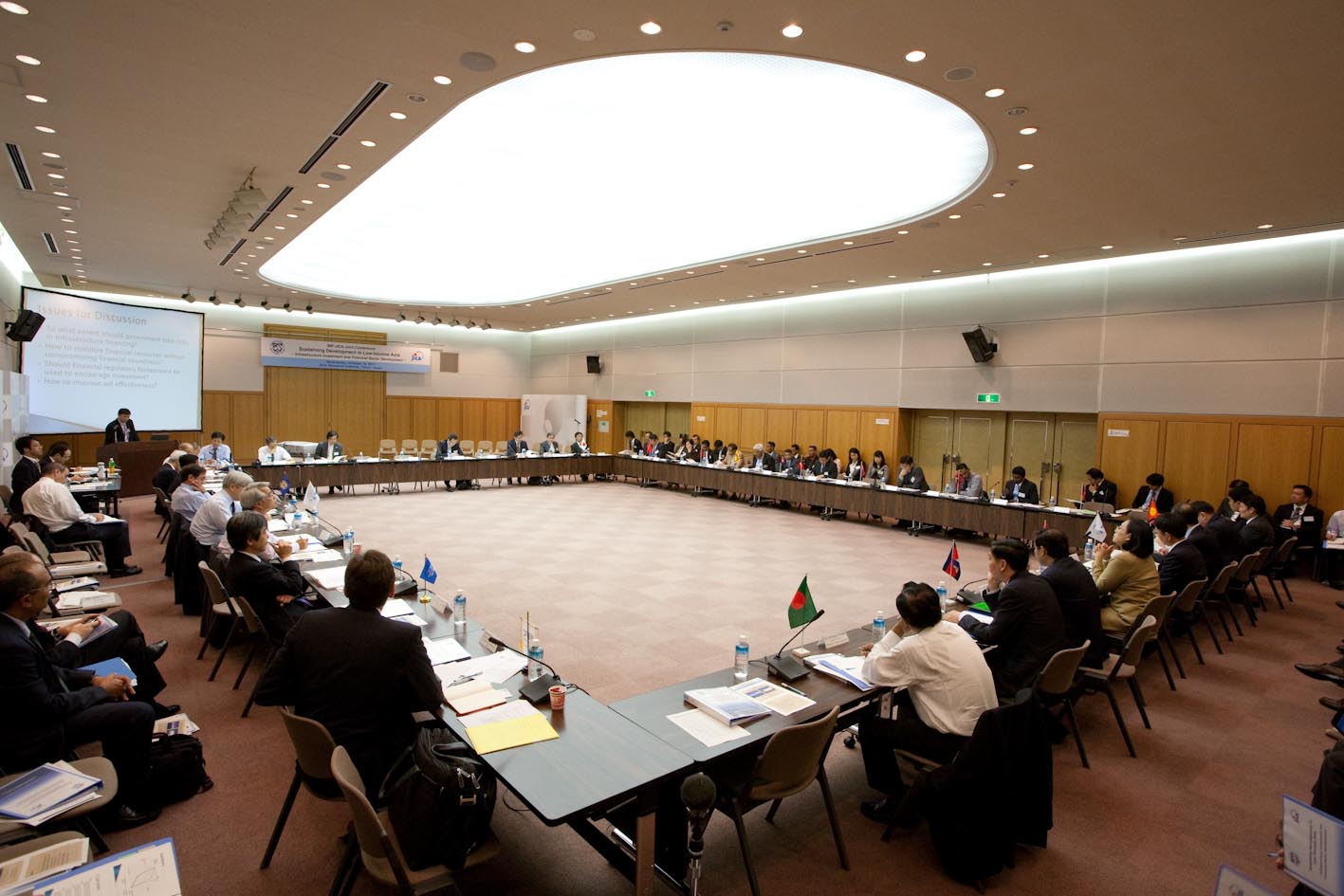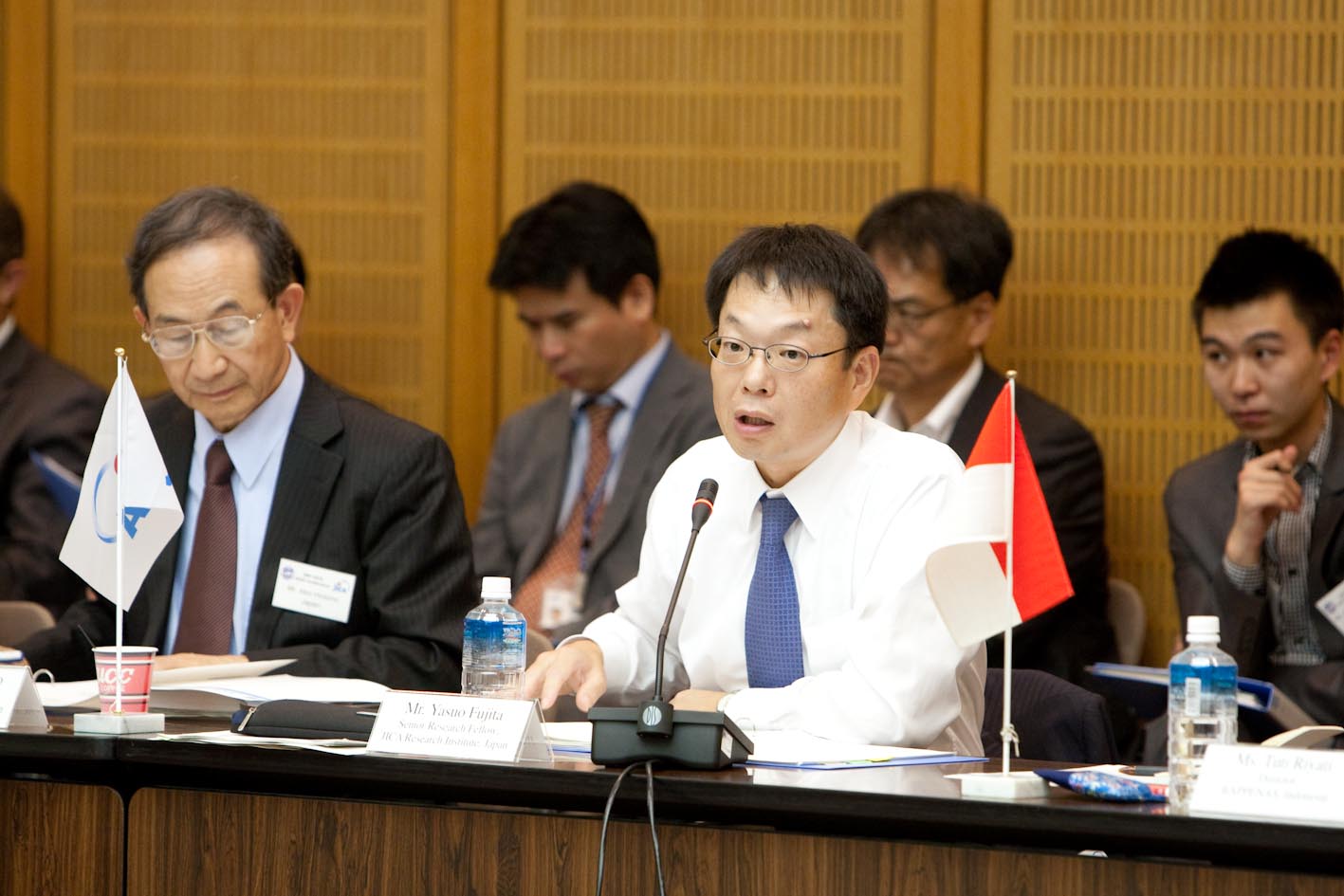JICA-IMF Joint Conference at JICA-RI Focuses on Ways for Sustainable Development in Low-Income Asia
2011.10.27

To discuss the issues Asia’s low-income countries (LICs) face and find ways for them to achieve sustainable development, JICA and the International Monetary Fund (IMF) convened an international conference “Sustainable Development in Low-Income Asia: Infrastructure Investment and Financial Sector Development” on October 12. About 100 participants including senior policymakers from various Asian countries, researchers and officials from aid community attended the event held at JICA-RI throughout the day.
The conference began with welcome remarks by JICA President Sadako Ogata, who emphasized that infrastructure investment and financial sector development can greatly help improve people’s living in LICs and it is one of the major cores of JICA’s operations.
Subsequent discussions focused on three main themes: 1) macroeconomic lessons from emerging market economies on infrastructure investment and its financing, 2) policy challenges for infrastructure development in Asian LICs based on lessons from the region, and 3) policy challenges facing the LIC financial sector.
Presenters and diverse selections of commentators addressed each agenda, and among them were the IMF Asia Pacific Department Director Anoop Singh, the Asian Development Bank Managing Director General Rajit Nag, and high-level ministry officials.
JICA-RI Senior Research Fellow Yasuo Fujita made a presentation on the second theme based on his research and results from some JICA’s recent technical assistance studies. Due to their limited fiscal space and governmental capacities despite the large investment needs, the prioritization of infrastructure investment in Asian LICs is indispensable to effectively narrow the infrastructure deficit, he explained. He stressed the significance of spatially connective infrastructure (logistics, telecommunication, electricity and others) so as to benefit from economies of agglomeration, production fragmentation and better connection to large markets. Thus the above mentioned type of infrastructure should be considered one of the priorities, he said.
He additionally pointed out that an attention should be paid to climate change needs in infrastructure development as infrastructure generally determines patterns of economic activities, energy consumption and people’s life style.
Moreover, he mentioned that to scale up private sector’s investment in infrastructure, which is an increasing trend in Asian LICs since 2005, their governments should clarify how the private sector can contribute, continue to enhance investment climate and other conditions, and prepare bankable and well-designed projects with the public and private sectors’ roles clearly defined.

Senior Research Fellow Yasuo Fujita in discussion session (right)
The final policy roundtable centered on inclusive growth in all Asia and also the need to develop “soft” infrastructure including education and health. Immediately after, the conference ended with JICA Vice President Kiyoshi Kodera’s closing remarks.
On the conference, Fujita says it was rare that it focused on Asian LICs as usually those like China and Indonesia are the subjects when developing countries in Asia are discussed. In talking about LICs in general, people refer to African counterparts mostly, and the Asian ones did not attract attention till now, he explains. Also, he adds, “This was the first joint seminar by the IMF and JICA. So I hope it will help promote the ties between the two organizations in the development of Asian LICs as well as that in other regions.”
Future development aid dialogues such as the Fourth High-Level Forum on Aid Effectiveness in Korea are expected to reflect the outcome of this conference.

事業事前評価表(地球規模課題対応国際科学技術協力(SATREPS)).国際協力機構 地球環境部 . 防災第一チーム. 1.案件名.国 名: フィリピン共和国.

事業事前評価表(地球規模課題対応国際科学技術協力(SATREPS)).国際協力機構 地球環境部 . 防災第一チーム. 1.案件名.国 名: フィリピン共和国.

事業事前評価表(地球規模課題対応国際科学技術協力(SATREPS)).国際協力機構 地球環境部 . 防災第一チーム. 1.案件名.国 名: フィリピン共和国.

事業事前評価表(地球規模課題対応国際科学技術協力(SATREPS)).国際協力機構 地球環境部 . 防災第一チーム. 1.案件名.国 名: フィリピン共和国.

事業事前評価表(地球規模課題対応国際科学技術協力(SATREPS)).国際協力機構 地球環境部 . 防災第一チーム. 1.案件名.国 名: フィリピン共和国.
scroll